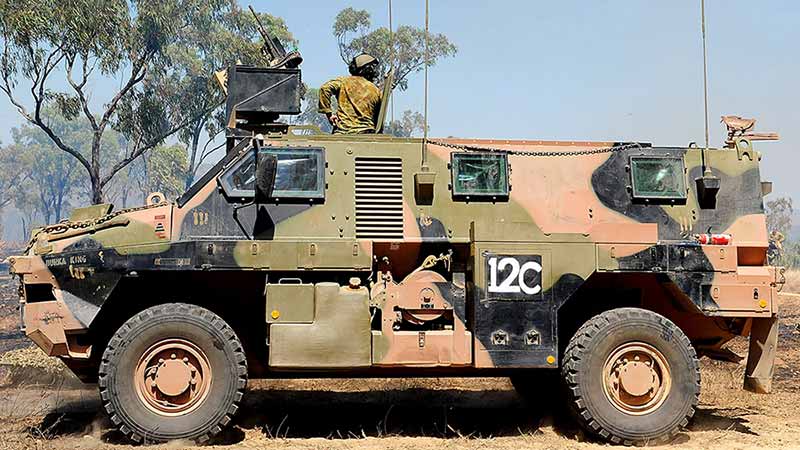Steel player upgrades profit despite local car factory closures

Heavy Metal ... Bisalloy may supply stell for the Australian Army Bushmaster troop carrier. Picture: Getty
With the closure of the car industry, Australian manufacturing may seem to have a wobbly future.
But that hasn’t stopped specialty steels processor Bisalloy Industries from a profit upgrade in late July, while promising better things to come in the year ahead.
And that’s before taking into account possible orders from the local defence industry, for frigates, or the Bushmaster troop carrier, which could come into play next year.
Bisalloy is tipping its gross profit, as measured by earnings before interest, tax, depreciation and amortisation (EBITDA) will rise around 50 per cent to $8-8.5 million in the year to June 2018, up from $5.4 million last financial year.
Bisalloy specialises in making heavy steel plate, which has traditionally enjoyed a ready market in the mining industry.
As that market flatlined, the company targeted the defence industry, working to gain accreditation to supply the defence industry in countries ranging from Israel, through the Middle East and even Germany.
This has also seen it seek accreditation with big players in the arms sector, such as BAE, the UK based supplier to the defence industry globally.
Jewel in the crown
“I think it is the jewel in the crown by a long way,” Bisalloy chief Greg Albert says of its defence sector prospects. “Even small volumes can transform the profitability of the company.”
Albert points out that supplying the defence industry can be “feast or famine” due to the lumpiness of orders. While quantities of steel ordered are not large, prices are high, which can translate to equally high profits.
Using its traditional strength in producing high tensile steel plate — typically 6 millimetres or thicker — Bisalloy is positioning itself to supply thinner steel product as well.
The push for lighter, but stronger, steel is one side effect of the pressure to move to a lower carbon emissions future, with rising demand right through the transportation sector, for example.
This has prompted Bisalloy to team up with a specialty Swedish outfit, Swebor Stal Sevenska, a privately owned maker of high strength thin steels. This has given the Australian company access to the lighter gauge market for protection steels in the civilian defence sector as well.
This market holds the promise of higher volumes, with demand growth fed by the rising need for protection in the present global environment.
“Traditionally, our markets have been reliant on the resources market,” Albert says. “It isn’t really growing, but we’ve recovered our market share. It has been a long process, but it has given us increased confidence over our forecasts.”
An increasing spread of sales offices in Asia, for example, has meant that when Caterpillar, which was a major customer in Australia, shifted local manufacturing to Asia, Bisalloy was able to win the work to continue supplying the group, for products which were manufactured in the region and then exported back to Australia.
Optimism for its near-term prospects has prompted the launch of a permanent night shift
with spending on new processes and equipment which will also hopefully position the group for defence sector work as decisions on large new projects are made over the next year or so.
Bisalloy fell 6c to 63c yesterday.
UNLOCK INSIGHTS
Discover the untold stories of emerging ASX stocks.
Daily news and expert analysis, it's free to subscribe.
By proceeding, you confirm you understand that we handle personal information in accordance with our Privacy Policy.








